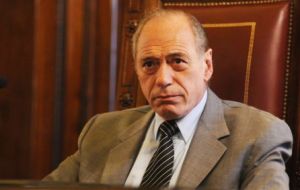MercoPress. South Atlantic News Agency
Argentine Supreme court Judge blasts the police and the political elite
 “The police are today the ones who lead coup d’états” said Zaffaroni who also suggested the political elite 'was afraid'
“The police are today the ones who lead coup d’états” said Zaffaroni who also suggested the political elite 'was afraid' To avoid a repeat of recent police strikes and the violence that followed the government should review the structure of Argentina’s police force, Supreme Court Justice Eugenio Zaffaroni declared, taking aim at both the country’s police and its political elite.
In an interview published in Mar del Plata’s daily La Capital, Zaffaroni described the recent police strikes that led to violence and looting across the country as “what had to happen,” adding that “worse things are possible if we don’t reconsider the structure of the police force.”
“Obviously we’ve got the same police structure from the nineteenth century. It’s a national police force, a militarized police force, a police force that grants itself autonomy with its own revenue collection,” the justice charged.
In his hard-hitting critique of the national security force, Zaffaroni also took aim at the country’s political elite by suggesting they “were afraid” of the police.
“I suppose in the last 30 years of democracy the political elite has had time to realize this. The last nudge against (former president Fernando) De la Rúa was from the police. Duhalde had to leave early because of Kosteki and Santillán,” the justice explained, referencing the notorious murder of two protesters at the hands of police during the country’s economic crisis in 2002 which led to the resignation of then-caretaker president Eduardo Duhalde.
“The police are today the ones who lead coup d’états,” he added, explaining that the political response to the current police crisis was because national politicians “are afraid, they don’t know, they don’t understand.”
“They think that just by fixing the leadership (of the police force) they’ll solve the problems, but they don’t realize that they can only re-organize this leadership up to a certain point,” he explained.
Justice Zaffaroni — who was appointed to the Supreme Court in 2003 by late former president Néstor Kirchner — suggested it was a serious error of judgment to push for harsher law enforcement.
He linked society’s demand for zero tolerance toward offenders to increased illegal revenue “collection” by police, who in this sense were effectively granted a space in which to be corrupt.
Society “asks for greater police autonomy, more discretionary powers, (but) it becomes arbitrary and that’s the space for collection,” he said. “Others call it corruption, but I dramatize it and call it collection.”
Zaffaroni did not also shy away from frank mention of reforms that had been passed during his time at the Court, criticizing the so-called “Blumberg Law” which in 2004 — following the kidnapping and murder of Axel Blumberg, the son of textile businessman Juan Carlos Blumberg, in 2001 — led to amendments to the Penal Code including a hike in the maximum sentence for serious crimes to 50 years’ imprisonment.
“What’s come out of the Blumberg reform is crazy, and we know why it was passed,” he said, while also backing claims that the 50-year maximum is in fact unlikely to ever be handed down to an offender.
“In my personal opinion, just like before the Blumberg reform. The Rome Treaty was signed and it established the maximum penalty for genocide at 30 years,” he explained. “I think that repeals previous maximum sentences because there can’t be a crime more serious than genocide.” (BAH).-




Top Comments
Disclaimer & comment rules-

-

-

Read all commentsHow long can CFK afford to pay the Police what they want, before they turn on her?
Jan 14th, 2014 - 07:51 am 0Does she have a Praetorian Guard??
@1 At the rate she burns through the nation's money, she will have spent all of it 6 months before her term is over. Judging by the acceleration of the number of destructive policies, scandals, disasters, and the amount of money being spent; she will be lucky to survive 2014.
Jan 14th, 2014 - 12:09 pm 0increased illegal revenue “collection” by police, who in this sense were effectively granted a space in which to be corrupt.
Jan 14th, 2014 - 01:14 pm 0I've said many times the very core of Argentine Society is rotten. Until they take a serious stand against corruption, from “cash payments' in stores to ”expedited services“ from Govt Employees, to ”cash payments” for police tickets etc. They can not and will not ever succeed. They will only get poorer and dumber as time goes on.
2. At this rate it is doubtful CFK will make it to the end of her term.
Commenting for this story is now closed.
If you have a Facebook account, become a fan and comment on our Facebook Page!